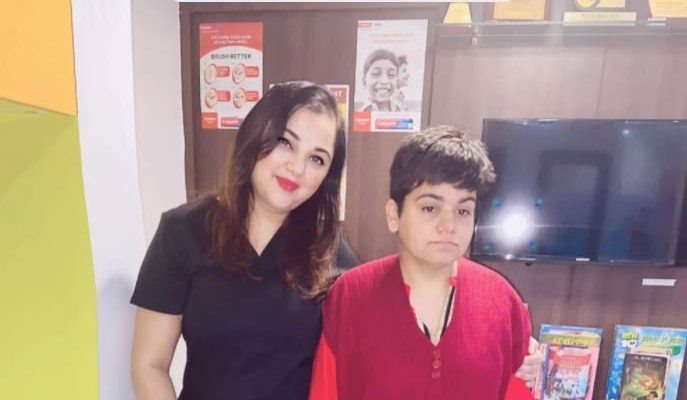-Dr Priya Verma

A disability is a story that sometimes requires subtitles for others to understand.
The arrival of a newborn is always associated with bringing joy to family but learning of something amiss about the child may splinter it down. This discrepancy between the perfect and real-world is the origin of a never-ending struggle. The awareness regarding children with special needs has been far from reality, such as brutal practices of throwing away children from cliffs upon suspecting a deformity to using them as entertainment material, practices which were common in Ancient Greece and Rome.
During the Middle ages, there was a decline in infanticide and the establishment of founding homes where more human practices evolved. It was indeed the need of the hour, and about time we realize that we need to be more inclusive in our thoughts and giving them a much-deserved childhood. Literature suggests that children were reluctant to interact with these kids, many others also reported a lack of acceptance. Children with low socioeconomic status were found to be more favorable in their behaviour than their counterparts. Girls were more empathetic than boys, especially when they were labeled as retard.
It’s not easy to be a parent of a child with special health care needs. There begins a journey that’s not only emotionally taxing, but also from being in a state of constant denial to ultimately embracing the disability. Behaviors like constant staring, discomfort, inappropriately ignoring or draw attention to the child makes a family withdrawn socially and becomes a cause of constant social stress. Wikler et al., (1981) suggested that parents develop 'chronic sorrow' that can be recognized by recurrent episodes of shock, pain, guilt and sadness. Rangaswamy (1989) said that the parents are plagued by shame and hostility, while Drew et al., (1984) described it as denial, projection of blame, guilt, grief, withdrawal, rejection, and acceptance are of the usual parental reactions.
The historic literature shows a very grim side for patients with special health care needs, whereas the boom in awareness and educational programs now have played a key role in bringing the big change in their lives. This short story of Punchika is an example to showcase the other side of the coin.
PUNCHIKA– as unique as her name, walked into my dental practice as a routine appointment case. As Fridays are always the beginning of a busy weekend, it took me a minute to notice that this wasn’t a regular appointment, and had to take her in on a priority basis. I briefly spoke to the family while having an eye on Punchika. She was listening but wasn’t very keen. At the same time, she was observing everything else happening around her. She decided to walk out of my consultation room, conversing with my dental assistant and other staff in no time. She was indeed quick to make friends with my otherwise busy assistant. I continued to observe her from far off, while recording her medical history and everything else.
I’m illustrating the information unfiltered as I received from her family: – Punchika, a 32 year old female with special health care needs who lives with her parents and her elder brother Gaurav, who was also instrumental in giving us her medical, family, and social history, spoke about his sister with a lot of affection and pride.
Gaurav said, “Despite her mental retardation and physical handicap, Punchika is a very blessed person. She has the unique ability to identify herself with nature. Occasionally she tends to talk to sunshine and rain as if she is interacting with human beings. She has an excellent memory and remembers the phone numbers and birth dates/anniversaries of almost all the family members and friends/acquaintances”.
Meanwhile, Punchika took everyone’s contact details that included me as well. I did not pay much attention to it and gave her the desired information, despite her social history. We planned her interdisciplinary treatment, which was complex. With the supportive therapy and with her immense cooperation, her treatment was well executed. She was given all the flexibility with appointments as she would not miss her school and daily soaps for anyone.


Due to my upcoming travel plan, the staff exhibited challenges in giving her further appointments. Therefore, upon much contemplation, I decided to have a chat with her to let her know that we need to wrap her treatment plan before I travel. She sounded a bit upset initially. Finally, she agreed to be regular with scheduled appointments going so far as to miss her favorite shows but with one condition that I get her a gift. When I asked her what she would like, she said “something in red” very excitedly. Her excitement and simplicity rubbed on all of us at the dental centre. I enjoyed picking up a red outfit for her.

When she wore the outfit later in the future visits, she let me know that she was wearing it just for me. I was moved. I completed her treatment, and that was the last I saw her as the lockdown was implemented in my city.
But that was not the end, one day, amidst the lockdown, I received the call from an unknown number, and to my surprise it was my dear Punchika! I realized she does have a fantastic memory. Punchika was quick to express her displeasure about not moving out of the house and wanted to visit the practice, I assured her that we would do that soon as everything settles down. She listened to me and agreed to follow the lockdown rules to stay safe at home.
A few weeks later, I received another call again from Punchika saying that she wasn’t feeling too well and wanted to seek an appointment. This got me a little worried, and I called up her brother to organize a visit for her. My call was a surprise to the family as they were totally unaware of her complaining of any dental issues. After some time, her brother called me back to let me know that all was well with her, and all she wanted was to see everyone at the dental center. This really touched me, and I told her that she didn’t have to be sick or in any discomfort to call me. I reassured her that I was very much present, and she could call anytime she wanted. Since then, she has called me up regularly and checks with me and others involved in her treatment. Her calls are something that I wait for eagerly. She brings in a simple kind of love and joy during these difficult times.
Besides being so lovable, she has many other qualities. She is highly observant of her surroundings and has an eye for detail. It was pretty surprising for us that she would remember everything from her last visit and question us about the shifting arrangement of toys and storybooks, which happens routinely in an exclusive pediatric practice as kids would come and play. We are using this ability of hers in giving instruction and turning it into an educational tool for her. She would learn the oral hygiene habits and teach it to everyone around her. With her strong desire to learn and execute, she educated everyone around her in her family and school.
When I interacted more with her family and teachers at the school, this is what they had to say…
“She exhibited the same determination during her vocational courses held at her school, embroidery on the handkerchief. It was not an easy task, considering that her left hand has 80-85% handicap. Even putting the thread into the needle was a big challenge. At times she used to cry, used to feel frustrated, but never gave up. With little encouragement from family/teachers and of course, because of her strong willpower, she has managed to finish the task assigned to her every time. She also has a great interest in sport activities, especially shot put, for which she has also won multiple competitions.”

Her greatest quality is the warmth and affection with which she interacts with everyone. Her pure soul understands no distinction between a maidservant/sweeper/guard or anyone else placed higher up in the social hierarchy.
Her parents said “In our house, we used to eat sitting at the dining table, while the maid used to sit on the floor while having her food. However, this did not fit in Punchika’s view of the world. She felt more comfortable having food with the maid, sitting on the floor. Any reasoning with Punchika did not convince her. Finally, Punchika helped us get over our prejudices, and now we all have our meals together at the dining table.”
She tries to interact with every person she comes in contact with. At times (although rare), some people are not receptive to her. Her brother would feel hurt on such occasions and counsel Punchika not to be such an extrovert. Her classic reply was that “one should try to speak to all.” She does not harbour any negative emotion against anyone who has not responded positively.
As her special care dentist, I want to say that, dear Punchika, you are a rarity, and we are fortunate to have you around us. Nevertheless, in this otherwise complicated world, you manage to stay grounded & simple. You are blessed with a loving family and their tireless efforts makes what you are today.
My take-home message to our dear readers would be to treat patients with special health care needs with more empathy and compassion, try looking beyond their disability and help them turn into a capability. We can learn so much from them. Our lives can be enriched in meaningful ways if we follow the path of inclusivity.
Disclaimer: The information provided here is with the due consent of the patient’s family & with the pure intent to highlight the need to overcome the barriers faced by clinicians
References
- Historical Background of Disabilities. https://us.sagepub.com/sites/default/files/upm-binaries26491_Chapter_1_Historical_Background_of_Disabilities.pdf
- Bhan S (1995). Parental Role in the Life of a Special Child. Disabilities and Impairment. An Interdisciplinary Research Journal; 9 (1): 37-43.
- Drew CJ, Logan DR, Hardman ML (1984). Mental Retardation – A Lifecycle Approach. Toronto: Times Mirror/ Mostle College Publishing.
- Rangaswamy K (1989). Construction of a Scale to Measure Parental Attitude Towards Problem Children. Child Psychiatry Quarterly; 22(2/3): 75-80.
- Sen A (1988). Psychosocial Integration of the Handicapped. New Delhi: Mittal Publications.
- Wikler L, Wasow M, Hatfielf E (1981). Chronic Sorrow Revisited: Attitudes of Parents and Professionals about Adjustment to Mental Retardation. American Journal of Ortho Psychiatry;51: 63-70. http://dx.doi.org/10.1111/j.1939-0025.1981.tb01348.x
- Chandramuki .Attitudes of Parents towards Children with Specific Learning Disabilities. Vol 23, No.1, 2012; doi 10.5463/DCID.v23i1.47
Further reading
Verma P. General Considerations Pg No 1-20.Pediatric Dentistry for Special Child 1st ed/ 2016. ISBN: 978-93-5250-193-9


















Well done mam! An excellent read????????
Thanks a lot dr zainab
Very inspiring read. So much to learn still. Thanks for sharing
Completely agree sir-so much more to learn from these kids everyday .. thank you for giving it a read
Very impressive. We need to take inspiration from such people who put their disability aside and move ahead in life. Thank you for sharing your experience doctor .